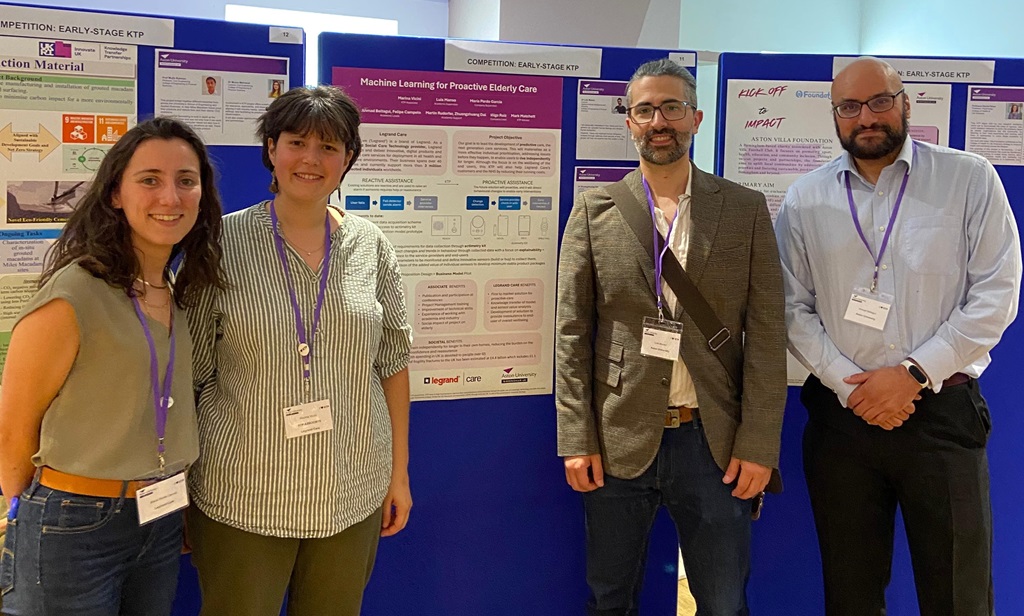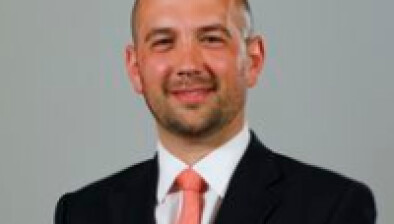University partnership aims to transform at-home monitoring

(from left) Maria Pardo Garcia, Marina Vicini, Luis Manso and Ahmad Beltagui
Experts in AI and business optimisation from Aston University are coming together with a global telecare provider to rethink how to deliver at-home monitoring to prevent falls and other incidents.
Aiming to help older people live independently for longer and more securely, the project will create a scientifically validated blueprint for the world’s first-to-market predictive assisted-living system.
Through a Knowledge Transfer Partnership (KTP) with Legrand Care, the research team are developing new ways to use and understand patterns of sensor data from across the home environment. By carefully monitoring changes to an individual’s day-to-day conditions and patterns, the novel system will be able to predict and signal various issues - such as loneliness, dementia, depression and risk of falls - so preventative care can be given. It will incorporate machine learning, advanced data analytics and the latest knowledge of human behaviour.
Ensuring the system can be widely adopted will be crucial because many assistive-living devices are purchased but rarely used. The project will determine the optimal range of sensors needed for a system that is both predictive and minimally disruptive. Expertise in business model innovation and human-centred design will support Legrand Care to develop a package that is technically advanced, affordable and acceptable to users.
If offered widely, this next generation predictive system has the potential to transform the care sector, with smart sensors across connected home and care environments that support care givers and provide peace of mind to relatives. Typically, care in these settings is reactive, responding only after a fall or incident has taken place. Preventing incidents will help to improve the long-term health and independence of older people so they can go about their day-to-day activities with confidence. Predictive assisted-living technology also has potential to facilitate more personalised care from service providers and reduce pressures on acute care services.
Inigo Ruiz, product and marketing director at Legrand Care, said: “Alongside the team’s collaborative spirit to improve wellbeing for older people, one of the most exciting aspects of this project is the opportunity to access the breadth and depth of expertise from across Aston University. Offering a preventative, predictive system will transform how at-home services are delivered, helping care providers to give the best possible proactive care for older adults.”
Dr Luis Manso, senior lecturer (associate professor) in applied AI & robotics at the Aston Centre for Artificial Intelligence Research and Application (ACAIRA) said: “The level of involvement of every member of our multidisciplinary team on this KTP is really refreshing as we all bring different perspectives to the table. By applying our predictive models to a completely different domain, we’re helping Legrand Care to not just develop new products, but to improve the products they already have.”
To overcome both the technological and business challenges associated with this level of innovation, the Aston University team are applying extensive academic insights in product design engineering, data analytics, statistical modelling, machine learning, human behaviour and business model innovation.
The KTP is led by a team across ACAIRA and Aston Business School. Recognised internationally for expertise in computer science, artificial intelligence (AI), and business optimisation, applied research across these groups is developing AI-based solutions to address critical social, health, and environmental challenges. This includes a series of impactful KTP projects in advanced traffic monitoring, fraud detection and crop production. Their collaborative research contributes significantly to Aston University’s vibrant innovation ecosystem, delivering transformational change with industry partners at regional, national and international levels.








